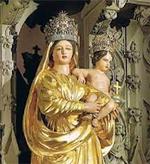Make your gift today!
Help keep Catholics around the world educated and informed.
Already donated? Log in to stop seeing these donation pop-ups.
Catholic World News News Feature
No baptism for gay couples' babies says Quebec cardinal July 18, 2005
Cardinal Marc Ouellet of Quebec City told Canada's Senate last week during hearings on a proposed gay marriage law that if the law passes, the Catholic Church will not baptize the children of same-sex couples.
"If I take the example of the ceremony of baptism, according to our canon law," said the cardinal during his testimony before the committee hearing on Wednesday, "we cannot accept the signatures of two fathers or two mothers as parents of an infant. With a law that makes these unions official, situations like this will multiply and this threatens to disturb not just the use of our territory, but also our archives and other aspects of the life of our communities."
Several mainstream newspapers, however, have confused the issue by quoting an associate general secretary of the Canadian Conference of Catholic Bishops, Benoit Bariteau, who appeared at first to be in disagreement with Cardinal Ouelett. Bariteau was quoted as saying, "If the parents insist that the two signatures be on the act of baptism, if we say no, it will be their choice of seeking baptism or not." Certain newspapers took this statement and others to mean that Bariteau believed that if only one of the parents signed the baptismal act then the Church would perform the baptism.
LifeSiteNews.com spoke with Bariteau, who clarified that he was in perfect agreement with Cardinal Ouellet's statements and canon law. Bariteau complained that certain news sources had taken both his and Cardinal Ouelett's statements out of context and distorted the conclusions and created the confusion.
Canon 868 says, "For an infant to be baptized lawfully it is required... that there be a well-founded hope that the child will be brought up in the Catholic religion. If such hope is truly lacking, the baptism is, in accordance with the provisions of particular law, to be deferred and the parents advised of the reason for this."
Ouelett's statement to the committee partially reflects the fact that there is little well-founded hope that a baby brought into a homosexual home, which homosexual "parents" have no intention of altering their lifestyle, will be brought up in the Catholic religion, since homosexuality is so fundamentally contrary to Catholic teaching. The couple is demonstrating a public, persistent contempt for fundamental Catholic teaching by their relationship.
Bariteau explained that both members of a gay couple obviously cannot sign the baptism act because that automatically and tangibly violates the very specific nature of Catholic teaching on the nature of marriage and parenthood, included in canon law. However, he also agreed that even if only one of the homosexual "parents" signs the baptism act it "doesn't change the reality" that the parents are living in a manner that is directly contrary to the teachings of the Catholic faith.
"According to the canon law, the Catholic Church cannot accept two fathers or two mothers as parents of a child," affirmed Bariteau. "When a child's parents ask for baptism for a child, the priest has to apply the rules of canon law." However, although the Church obviously cannot baptize a child when canon law is directly violated, there are exceptions, such as if the baby is in danger of death, when the Church is required to baptize as soon as possible. As well, a child brought up by a homosexual couple and who achieves the age of reason may express his own desire to enter the Church, and then be baptized.






